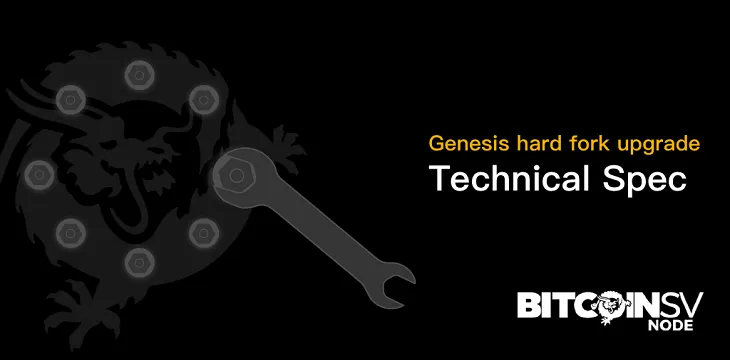|
Getting your Trinity Audio player ready...
|
The Bitcoin SV Node team has published the complete technical specification for the Genesis Hard Fork upgrade, scheduled for February 4, 2020. Everyone running the software will be affected by the change, and is advised to start testing as soon as possible. That includes not only miners, but also “blockchain listeners” like exchanges, wallets and any other applications that don’t write information to the blockchain.
The hard fork upgrade to the Bitcoin protocol will be the last big step towards closely restoring Satoshi Nakamoto’s original vision.
A complete rundown of all specs is now available on GitHub. To get everything running as smoothly as possible, there’s also a dedicated technical support page and Bitcoin SV Node team members can be contacted directly or via Telegram to answer questions.
Everything so far has run according to schedule. The Genesis beta launched on December 6, and the full technical specification came out on the 13th. The team is also encouraging all projects to begin testing their applications on the beta version, if they haven’t already.
Release candidate (RC) notes will be available on demand before the end of the year, and the first Stable Release will arrive on January 3, 2020. There will also be a second security audit during December, and the audit results will be published early in the new year as the final step before activation.
All changes will be activated before the hard fork on the Genesis Testnet. A second testnet, called “Genesis Reset” will start 24 hours before the fork, resetting itself every 48 hours to allow for repeated testing of changes in the transition.
What’s better than big blocks? Infinite blocks
The Genesis upgrade will introduce new capabilities in the form of scaling, and restore (or remove) parts of the original Bitcoin protocol that were controversially altered in the years since 2009. This will enable a new world of Metanet-based applications, tokenization, smart contracts, more instant confirmations, and time-locked transactions.
That 2GB block limit BSV implemented in its July 2019 “Quasar” upgrade was just an entree. In keeping with Satoshi’s vision of massive on-chain scaling, Genesis will remove default block size limits completely. Miners will now have the power to set their own block size limits—or have none at all.
The original functionality of nLockTime and nSequence will be restored, after they were repurposed by BTC Core developers. This allows, among other things, someone to send a Bitcoin transaction that will not be written to the blockchain until a certain time—a form of will or trust that could execute years into the future. This is only possible on a stable protocol that can’t be changed.
Bitcoin’s Script language will see its grammar formalized and the original function of OP_RETURN will return, making developers’ jobs easier. Additionally, Script’s numeric type will change from 32-bit numbers to “big numbers.” The release says this “will dramatically increase the mathematical capabilities of the Bitcoin Script language”, allowing even more advanced functionality.
Non-standard and complex transactions (eg: anything other than payments or plain data transactions) will now be available to everyone via relay across the peer-to-peer network (P2P Relay). These previously required direct contact and negotiation with a miner to complete.
New pay-to-script hash (P2SH) transactions will no longer be permitted post-Genesis, although previous transactions sent under this rule will remain valid. This will encourage better privacy practices and create a more honest record of events.
After February 4, 2020, Bitcoin will be more powerful, more consistent, and ready to start building a new global economy. And no-one will be able to alter it—“not even God,” according to Dr. Craig Wright. That’s the kind of stability Bitcoin was always meant to have.

 07-11-2025
07-11-2025 





